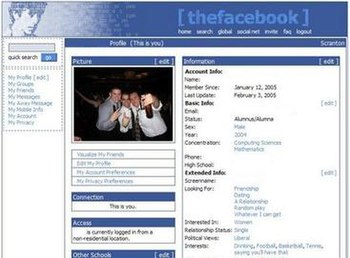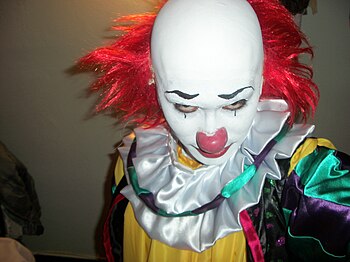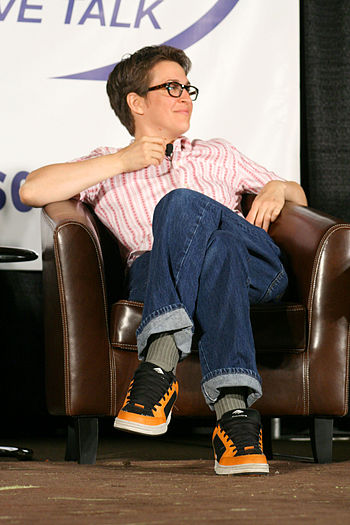No final grade until:
1) Evidence of submission of restaurant and one other piece of content from this semester.
2) One piece of multimedia posted on Videolicious from profile.
The 0166-325 in the 94117
This is the blog of the Magazine Writing class at the University of San Francisco for Fall semester 2017.
Thursday, November 30, 2017
Thursday, November 9, 2017
Some Gary Kamiya Links
| Profile shown on Thefacebook in 2005 (Photo credit: Wikipedia) |
through Salon
research rapture
on facebook
And I just asked to become his Facebook friend. But what if I were profiling him? Lots of posts on this topic.
On to Linked In.
barbarians at the parlor door
this is a serious thoughtful guy
let us now praise editors
Salon's first ten years
one city under the syringe
the outsiders
Let's make an assignment out of this: Do a 1-2 page "snapshot" of Gary with some good description, due Thursday. One sentence in your draft should begin, "When I asked him my toughest question, he........"
If the question is so obvious that his response would naturally arise in an interview without prompting, you will edit out the lead-in.
Sunday, October 29, 2017
How She Became a Staff Writer at the New Yorker
 |
| The "New Yorkistan" cover of The New Yorker (Photo credit: Wikipedia) |
.... and I was like, “How do you like your assistant job at New York magazine?” She got me an interview to be an intern there for the gossip column, the Intelligencer. And I got that.
My first day, Beth Landman, who was a columnist, says, "Call Alexis Stewart, Martha's daughter, and ask how she feels about the fact that her father is about to have a baby with another woman." And I'm 21 and I'm like, "Are you serious?" It was lots of figures who are now meaningless, except, of course, for the orange monster running the free world. It was people like that, people that low. I cried in the bathroom every day — it was just a big departure from anything I'd ever experienced. But it was a great first job for a reporter because it was just terrifying, hideous things and you had to do it.
I was clawing like a rabid cat — I was always clawing. I was like, I'm going to get a job where I write for a living if it kills me.
Labels:
ambition,
how to be a writer,
New Yorker
Wednesday, October 25, 2017
Fright Death Murder Etc. - The Halloween Assignment
| English: HALLOWEEN PENNYWISE COSTUME Español: DISFRAZ PENNYWISE HALLOWEEN (Photo credit: Wikipedia) |
Can you be in the story? Sure. But the ratio of you to your sources better be 1:3 and up. (Yes, of course, you can do this assignment in costume.) Take photos.
Here are some possible questions:
1. Why are you wearing that costume? Is that the real you?
2. Have you used your costume to frighten anyone? Do you intend to? Should I be afraid of you?
3. What other costumes did you consider?
4. What are your own greatest fears?
5. Movies that frighten you?
6. People that frighten you?
7. Is it healthy to be frightened of movies, people, things, etc.? Why?
Here are some other sources of information that might suggest provocative questions. Story is due by class time Thursday.
25 frightening halloween costumes
Halloween is that time of year where people put on scary costumes and scare the guts out of their friends. We’re talking about scary ghouls, demons, zombies, mummies, and a host of other bizarre creature-like things! Are you thinking about which Halloween costume you will wear this year? If so, you should check out our list. From the living dead to bizarre demons, these are 25 most terrifying Halloween costumes.
The worst ways to die
The worst ways to die, as voted on by the Ranker Community. Sure, it's a little morbid, but who doesn't think about death every once in a while?
Vote on the worst ways to kick the bucket, and see how your fears stack up against everyone else's. Just don't tell that Grim Reaper dude about any of this...If you had to choose your own means of execution, what would you choose?
From the wikipedia page:
"The Euthanasia Coaster would kill its passengers through prolonged cerebral hypoxia, or insufficient supply of oxygen to the brain. The ride's seven inversions would inflict 10 g on its passengers for 60 seconds – causing g-force related symptoms starting with gray out through tunnel vision to black out and eventually g-LOC (g-force induced loss of consciousness). Depending on the tolerance of an individual passenger to g-forces, the first or second inversion would cause cerebral anoxia, rendering the passengers brain dead.[citation needed] Subsequent inversions would serve as insurance against unintentional survival of particularly robust passengers."
Also supposed to cause hallucinations due to lack of oxygen. Execution by a deadly roller-coaster version of Mr. Toad's Wild Ride?
Sign me up.
By the way, who would you kill?
We’re not saying you want to kill anyone, necessarily. But let’s say there’s a circumstance where you could just totally get away with it, and no one would ever know, and maybe there’s even additional circumstances where you need to kill them. Like what if you’re on a lifeboat with no supplies and you need to murder and eat the other survivor before hunger makes you weak and/or they get the same idea as you? Or maybe your rich uncle is taking a little too long to die? Or perhaps you're just a bored aristocrat who craves the thrill of flying homeless people to your private island and hunting them for sport? Whatever the case, who would you kill?
Related articles
 Halloween costumes for your baby who can't say 'No' yet
Halloween costumes for your baby who can't say 'No' yet No, Fox 'News', Ohio State University Halloween Costume Guide Isn't Really A Thing!
No, Fox 'News', Ohio State University Halloween Costume Guide Isn't Really A Thing! Actress Apologizes for 'Blackface' Costume and Now People Are Offended That Other's Were Offended
Actress Apologizes for 'Blackface' Costume and Now People Are Offended That Other's Were Offended The 50 most popular Halloween costumes this year, according to Google
The 50 most popular Halloween costumes this year, according to Google Google is using national search data to help people pick Halloween costumes
Google is using national search data to help people pick Halloween costumes Anne Frank Halloween Costume Pulled From Stores After Uproar
Anne Frank Halloween Costume Pulled From Stores After Uproar
Maddow and Malcolm
| Talk show host and commentator Rachel Maddow. All of the am 1090 Progressive Talk (am1090seattle.com) hosts (from Air America and Nova M Radio) held a 3 hour town meeting in Seattle. (Photo credit: Wikipedia) |
Janet Malcolm’s most famous (notorious?) work involved journalist Joe McGinniss, the author of Fatal Vision, his account of Dr. Jeffrey MacDonald, convicted of killing his wife and daughters. There will be no sense of trust betrayed in a very solid Rachel Maddow profile in The New Yorker.
It’s inescapably engaging and offers a sense of a self-constructed high-wire that Maddow labors on with great intellectual honesty each evening via a long opening monologue that makes Sean Hannity’s opening a virtual tweet. Maddow is refreshingly candid about the perils of it all, as well as her own personal demons, such as depression. She’s reached the point where celebrity, and her likely encirclement by admirers and sycophants, can bring a distinct homogeneity to interview responses and a self-indulgence to one’s work. But even if you’re not a fan, take a look and you might be won over.
BongReads: Janet Malcolm Editon
There is not a writer out there who's better at producing work that simultaneously elucidates its subject and interrogates its own form than Janet Malcolm, the reporter and critic who writes primarily for The New Yorker and happens to be my favorite writer in the universe.
Malcolm literally wrote the book on journalism — The Journalist and the Murderer, which since its 1990 release, has become a staple of Journalism 101 syllabi — by slyly scoffing at its conventions, breaking the rules so that she may point out the artificiality of the form. Her prose is acerbic, able to cut her subjects (often overeducated egotistical man-babies who more than probably deserve whatever snark's coming to them) down to size in half a line. She inserts herself into her stories, discussing her processes and impressions in a way that makes each piece about its own construction as much as it's about the actual subject. And, unlike many of the journalists who take her to task for her contradictions, she's uninterested in befriending her subjects, instead using their foibles to point out the weaknesses and outright failures of the institutions that her subjects represent. All of this is to say that she's everything a journalist ought to strive to be — honest, discursive, fearless, and fair in her own unique ways.
So without further adieu, here's a selection of my favorite pieces Janet Malcolm has written for The New Yorker. They are all long, and together they will break your brain.
Rachel Maddow: Trump's TV Nemesis (2017)
To paraphrase Biggie, Malcolm dropped unexpectedly like bird shit on Monday with a new piece in tow, a profile of Rachel Maddow which on its surface seems to fawn over the MSNBC star but that, when we peel back a layer or two, becomes something much more complicated. As Malcolm sees it, Maddow is less a commentator and more of a rhetorical magician. By unsuccessfully mimicking Maddow's methods in an unexpected left turn towards the piece's conclusion, she both exposes her trick as something specious and only tangentially tied to the truth while praising the skill required to pull it off.
Somebody not so happy:
"Her performance and those of the actors in the commercials merge into one delicious experience of TV."
Dearest darlings, it's delicious! Delicious all the way down!
Be honest just this once! Doesn't that sound exactly like the type of experience we liberals have mocked, for many decades, as the quintessentially dumbnified "Amerikan" TV experience? Doesn't it seem that something is odd, off, peculiar, wrong when we find this peculiar experience lauded in our brainiest high-end magazine?
We aren't quite finished with our account of what our best writer said in that third paragraph. In that third paragraph, she makes statements about the Maddow Show which echo the things we ourselves have long said—but she's praising the show as she makes these remarks, while we have long offered these assessments as condemnations....
The Canister Apology
Labels:
Janet Malcolm,
New Yorker,
Rachel Maddow
Wednesday, October 18, 2017
Reminder: Submit Your Restaurant Review
 |
| The restaurant in The Palace Hotel (37.7880° -122.4019°) in San Francisco, California, United States. (Photo credit: Wikipedia) |
Tara:
Sarah:
Greta:
Nick:
Jeremy:
Quin:
Lonny:
Excerpts from Village Voice Article on 2nd Malcolm-Masson Trial
 |
| Sigmund Freud, founder of psychoanalysis, smoking cigar. Español: Sigmund Freud, fundador del psicoanálisis, fumando. Česky: Zakladatel psychoanalýzy Sigmund Freud kouří doutník. (Photo credit: Wikipedia) |
mistrial. In answering a detailed questionnaire, the jury found that all five quotes were false, and that two of them fulfilled the additional requirements needed to find that Masson had been
libeled (those requirements being that the quotes defamed him and were published with "reckless disregard for the truth"). Malcolm was shocked by the outcome, since going to the trial she had the confidence (some would say arrogance) to believe that her journalistic
methods and general credibility were beyond question. After all, she wrote for The New Yorker-the citadel of American journalism, whose reputation for factual accuracy was virtually unassailable. Much to her surprise, she found that the jury was extremely skeptical about many aspects of her defense: they doubted the accuracy of the four typed pages, on which three of the five disputed quotes appeared; they believed that the quotes had been
deliberately altered; and, in the end, they couldn't come up with a reason why Masson would have said the damaging things he had denied saying.
***
Borrowing a strategy from Bostwick's own playbook, Masson used the theme of "a friend
betrayed" to press his case. In Jeffrey MacDonald's suit against Joe McGinniss, Bostwick had
made a lot of the fact of McGinniss's blatant dishonesty in pretending to be MacDonald's friend
long after he believed he was a crazed killer. Now it was Masson's turn to play the role of
betrayed intimate, as he complained that he had never expected Malcolm actually to use much
of the unflattering personal information he had shared with her. Although a huge portion of
their interviews centered on his sex life, Masson claimed he had believed Malcolm's article
would confine itself to his scholarly work, and that his personal revelations had been little
more than friendly, off-the-record chitchat. He was shocked, shocked, that she went ahead
and printed them.
***
Examining the three massive, unedited volumes of transcripts made from the taped
interviews, it seems obvious that their relationship was fated to end tragically. Their
expectations were tremendous: In Masson, Malcolm thought she had found the perfect,
completely uninhibited subject; in Malcolm, Masson believed he had an all-forgiving confessor.
"You are the absolute, the most open person I've ever met in my life," Malcolm gushes
gleefully of the suicidally compromising material Masson so obligingly offers. "I'm perfectly
prepared to say anything - including my sexual feelings for you," he responds. "I really feel
that I've committed myself to you," he adds.
***
The third, and most effective, part of Bostwick (her lawyer's) plan required that he trick Masson into
opening up a line of inquiry Masson would just as soon have avoided. Since Masson was
complaining that Malcolm had made him look foolish by taking only the most unflattering
information from their interviews, Bostwick wanted to show that she had used some of the
really damaging information Masson had told her, the article could have been much, much
worse. The notion that Malcolm had actually spared Masson's feelings will come as a surprise
to anyone who has read "Trouble in the Archives," but this is precisely what Bostwick set out
to prove.
***
For Malcolm, whose practice of "compressing" quotes and rearranging scenes has been
questioned, The Silent Woman (her book published just before the second trial) sometimes reads like a response to her critics. As if to reassure suspicious readers that no scenes were concocted she tells us exactly where everything happens–"on a train to Cornwall, "in the Indian restaurant," - documenting each step of her journey. In a finale of stupendous literary circularity, Malcolm concludes with a scene that shows her taking the notes she will later use to write the book. "I would want evidence that Ihad not merely conjured it up for the purposes of my plot but had seen it as well," are the book's final words.
The fact that Masson agreed to be interviewed and talked so freely fails to alleviate Malcolm's
dilemma. In her uncompromising moral universe, the moment the tape started to record, so
too began the betrayal. Her legal vindication, while significant, does nothing to resolve the
murky ethical quandary that is at the heart of all journalism. Her refusal to flinch in the face of
our moral chaos is unnerving. "The freedom to be cruel," she reminds us in The Silent Woman,
"is one of journalism's uncontested privileges."
Subscribe to:
Comments (Atom)








